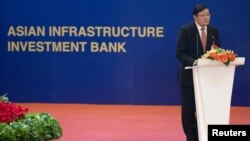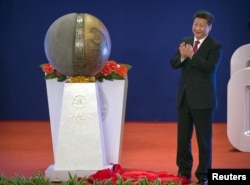The new Asian Infrastructure Investment Bank, backed by China as a potential rival to the World Bank and other international lenders, opened Saturday in Beijing. The 57 member nations have contributed $100 billion in capital to the AIIB, making it nearly half the size of the World Bank as it begins operations.
"This is a historic moment," said Chinese President Xi Jinping, who first proposed a multilateral Asian bank to support infrastructure development projects more than two years ago.
Xi said the new bank would have an important role in making "the global economic governance system more just, equitable and effective."
China provided 30 percent of the new bank's capital, the largest share. AIIB is the first multilateral bank that does not have the United States and Japan as partners.
Establishing the infrastructure bank is seen as a culmination of Xi's personal efforts since October 2013, when he first proposed it. He met a large number of world leaders to seek support for the bank. Chinese experts have been saying that the World Bank and Asian Development Bank did not have a fair governance system because they were dominated by the U.S. and Japan.
China said the AIIB would work with other multinational lenders on Asian infrastructure projects, and both the World Bank and the ADB issued statements Saturday saying they would cooperate with the AIIB.
The new bank’s board of governors elected Jin Liqun, a former executive at the Asian Development Bank and Chinese government official, as AIIB’s first president, for a five-year term.
"AIIB is now ready to join the family of multilateral financial institutions, investing in sustainable infrastructure for the improvement of lives across Asia,” Jin said after his election.
US 'loss of influence'
The AIIB has been seen as a potential rival to the World Bank and ADB since Britain, Germany, France and Italy joined it last year.
“These are governments that normally do what the U.S. asks in foreign policy matters, unless it is politically impossible for them to do so. So this demonstrated a significant loss of influence of the U.S. government over its most important ally, Europe,” Mark Weisbrot, co-director of the Center for Economic and Policy Research in Washington, told VOA.
The analyst said the new bank in Beijing would further boost China’s image as an infrastructure builder if it can foster projects constructed at lower costs in a sustainable manner.
China's Xi said the bank would "effectively boost investment for infrastructure in Asia, channel more resources — particularly private investment for infrastructure projects — and promote regional connectivity and economic integration."
In addition to China's $30 billion share of the bank's capital, Xi said his government was willing to invest an additional $50 million for infrastructure projects in less-developed countries. Analysts said the gesture was intended to highlight China's commitment to assisting poor countries where there is no matching effort by the U.S.
Though China does not have formal veto power and holds less than one-third of the voting shares, it will still have considerable influence because the bank is headquartered in Beijing. India, the second-biggest shareholder, sent a finance ministry official to Saturday's ceremony instead of one of its top government leaders.
US allies
U.S. allies that joined the new bank — South Korea and the Philippines, in addition to Britain and other European powers — apparently felt it would be risky to stand apart from China’s international ambitions, analysts said. Germany, the bank's biggest shareholder among non-Asian countries, also is expected to seek opportunities in the construction and renewal projects the bank is expected to finance.
“Britain has a great deal of expertise in respect of infrastructure building, infrastructure financing, green financing, project management, construction,” Mark Boleat, chairman of the policy and resources committee at the City of London Corporation, told Beijing state television.





